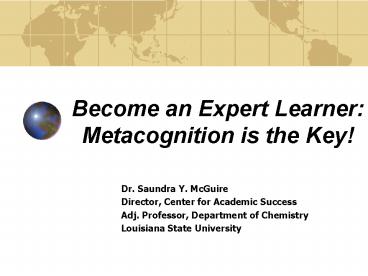Become an Expert Learner: Metacognition is the Key - PowerPoint PPT Presentation
1 / 28
Title:
Become an Expert Learner: Metacognition is the Key
Description:
... phone numbers, dates, names, etc.) Meaningful Learning ... visit out website at www.cas. ... Please feel free to contact me at smcgui1_at_lsu.edu if you want ... – PowerPoint PPT presentation
Number of Views:176
Avg rating:3.0/5.0
Title: Become an Expert Learner: Metacognition is the Key
1
Become an Expert LearnerMetacognition is the
Key!
Dr. Saundra Y. McGuire Director, Center for
Academic Success Adj. Professor, Department of
Chemistry Louisiana State University
2
Desired outcomes
- You will analyze your current learning strategies
- You will understand the difference between
meaningful learning and rote memorization - You will have concrete strategies to use during
the remainder of your academic career, and you
will USE them! - You will see become a more efficient learner
3
What we will cover tonight
- Why Golden Key Members may be inefficient
learners - Time Management Strategies
- Using Metacognitive Strategies to Ace Exams
- Learning Strategies that work, and why
- Barriers to Using These Strategies and How to
Overcome Them
4
Reflection Question
- Did you study a lot in high school?
- Approximately how many hours per week do you
study at LSU? - Is this number of hours too few, too many, or
just right for you to learn everything you want
to learn?
5
Turning Bs into As
- The 20 80 rule
- Discipline pays
- Aim for 110 mastery
6
Rote Learning
- Involves verbatim memorization
- (which is easily forgotten)
- Cannot be manipulated or applied to novel
situations - (e.g. remembering phone numbers, dates, names,
etc.)
7
Meaningful Learning
- Learning that is tied and related to previous
knowledge and integrated with previous learning - Can be manipulated, applied to novel situations,
and used in problem solving tasks - (e.g. comparing and contrasting the Arrhenius
and - B-L definitions of acids and bases.)
8
Meaningful learning is a continuous, ongoing
process repetition is the key. let it soak
in
9
Judgment the ability to make decisions and
support views requires understanding of values
Evaluation
Combination of information to form a
unique product requires creativity and
originality
Synthesis
Identification of component parts determination
of arrangement, logic, semantics
Analysis
Use of information to solve problems transfer of
abstract or theoretical ideas to practical
situations.
Application
Identification of connections and relationships
Interpretation
Restatement in your own words paraphrase summary
Translation
Verbatim information memorization with no
evidence of understanding
Recall
10
Time Management is Life Management
11
The Jar of Rocks
12
Time Management Tools
- Semester Calendar
- Weekly Calendar
- Daily Planner
13
Tips to remember...
- Use daylight hours wisely!
- 1 day light hour
- about 1 1/2 evening hours.
14
Using Metacognition to Become an Expert Learner
15
Metacognition
- The ability to
- think about thinking
- be consciously aware of oneself as a problem
solver - to monitor and control ones mental processing
16
Experts vs. Novices
- They think differently about problems
17
Novices vs. Intelligent Novices
- Intelligent novices learn new domains more
quickly than other novices - The Metacognitive skills make the difference
18
What intelligent novices know
- Learning is different from memorization
- Solving problems without looking at the solution
is different than using the solution as a model - Comprehension of reading material must be tested
while the reading is in progress - Whether the answer to a problem makes sense
19
Turning Yourself into an Intelligent Novice
- Do think aloud exercises
- Think about how you react to different types of
problems (e.g. frustration, determination, etc.) - Recognize the difference between learning and
memorization
20
Study Strategies Gold Nugget
- The Study Cycle with
- Intense Study Sessions
21
The Study Cycle
Phase One Read or preview chapters to be
covered in class before class (Create
chapter maps) Phase Two Go to Class. Listen
actively, take notes, participate in
class Phase Three Review and process class
notes as soon as possible after class Phase
Four Incorporate Intense Study
Sessions Repeat
22
Intense Study Sessions
- 2 - 5 minutes Set goals for next 40 min.
- 30 - 40 minutes Read text more
selectively/highlight - Make doodles/notes in margins
- Create mnemonics, work examples
- Create maps
- 5 minutes Review what you have just studied
- 10 minutes Take a break
- Repeat
23
Get the Most Out of Homework
- Start the problems early--the day they are
assigned - Do not flip back to see example problems work
them yourself! - Dont give up too soon (lt15 min.)
- Dont spend too much time (gt30 min.)
24
Get the Most from Tutorial Centers, Office Hours,
Study Groups
- Try to understand the concept or work the problem
by yourself first - Come prepared to ask questions
- Explain the material to the tutor or instructor
25
Make Study Groups Work FOR You, Not AGAINST You!
- Set ground rules for the study group
- No meetings the day the problem set is due
- Be present, on time, and prepared
- Do your part or be barred from the session
- Each one teach something!
26
Writing Exercise
- What behavior will you change
- for the next three weeks?
27
If you dont try it in within the next 48 hours...
- you probably never will.
28
Final Note
- Please visit out website at www.cas.lsu.edu.
- We have on-line workshops and information that
will teach you more effective study strategies.
Please feel free to contact me at smcgui1_at_lsu.edu
if you want more information. I wish you a
fantastically successful future! - Dr. Saundra McGuire

